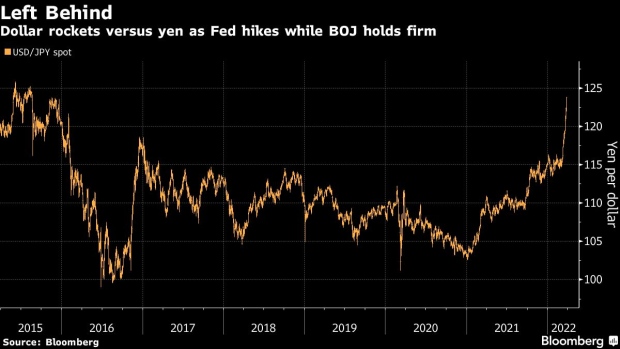Mar 28, 2022
Yen Tumbles to Seven-Year Low as BOJ Divergence With Fed Widens
, Bloomberg News

(Bloomberg) -- The yen plunged against the U.S. dollar as the Bank of Japan continued to ease monetary policy aggressively, widening the policy divergence with the Federal Reserve.
The yen fell as much as 2.4% to 125.09 against the greenback on Monday, the weakest since August 2015, after the BOJ offered for the first time ever to buy an unlimited amount of 10-year notes over the next three days. The Fed raised interest rates earlier this month and said more tightening would follow to curb soaring inflation, fueling a global debt sell-off.
The Japanese currency is down more than 8% against the dollar so far this year, by far the biggest slide among major peers as traders position for widening interest-rate differentials to weaken the currency. BOJ Governor Haruhiko Kuroda earlier this month said policy will remain unchanged even if inflation jumps, doubling down on his commitment to continue with stimulus.
“As long as global yields continue rising and the Bank of Japan pledges unlimited support for its bond market, the pressure on the JPY to weaken continues,” said John Hardy, the head of FX strategy at Saxo Bank A/S. “The next major resistance in the USDJPY chart is the near-20 year high from 2015 at 125.86.”
Markets have been speculating on the policy implications of the yen’s moves, with economists at JPMorgan Chase & Co saying it could prompt the BOJ to tweak its yield curve control framework, which aims to cap the 10-year yield on government bonds.
Governor Kuroda said last week stable inflation was needed to trigger policy change at the central bank, not yen weakness. Japanese Chief Cabinet Secretary Hirokazu Matsuno on Monday said the government is paying close attention to trends in foreign exchange markets, including the recent depreciation of the yen.
“The rapid collapse of the yen which we have been observing since the beginning of March is likely to have been too rapid even for the BOJ’s taste,” said Ulrich Leuchtmann, head of currency research at Commerzbank AG. “However, we must not forget: the BOJ should really be in favor of a weak yen.”
(Updates pricing.)
©2022 Bloomberg L.P.





